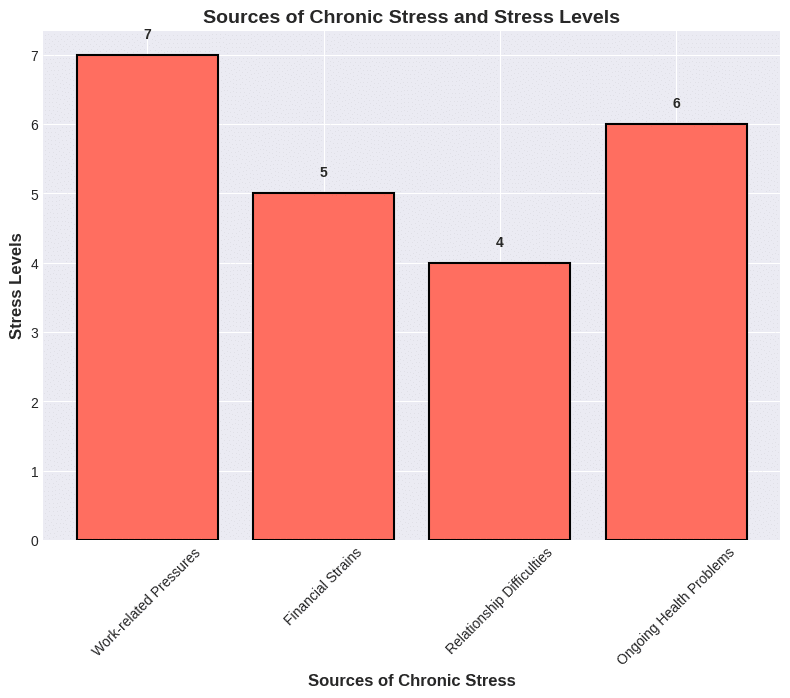Once upon a time, stress became a familiar word in everyone’s life. We often hear about stress; surprisingly, it’s not always bad. Believe it or not, there’s such a thing as positive stress, which can be beneficial. This type of stress triggers the release of adrenaline, boosting our decision-making abilities and productivity. However, not all stress falls into the positive category. There’s a darker side to stress called chronic stress, and it can wreak havoc on our bodies.

Imagine this: You find yourself caught in the clutches of chronic stress, which starts taking a toll on your physical well-being. Muscular pain becomes a constant companion, making your daily life a struggle. But fear not, for there is hope. Let this information sink in as we embark on a journey to explore the causes, symptoms, and solutions of chronic stress.
What is Chronic Stress?
Chronic stress is a term used to describe ongoing exposure to stressors that repeatedly activate the body’s stress response system. Unlike short-lived stress, which occurs in response to immediate threats or challenges, chronic stress persists over an extended period. It can originate from various sources in our lives, such as work-related pressures, financial struggles, relationship difficulties, or ongoing health problems.

Causes of Chronic Stress
Let’s delve into each of these sources:
Work-related Pressures
Many individuals experience chronic stress due to excessive workloads, long hours, demanding deadlines, or a high-pressure work environment. These factors create a continuous state of tension and overwhelm.
Examples
- An individual working in a high-demand job with tight deadlines and a heavy workload.
- A manager is responsible for overseeing multiple projects and handling employee performance issues.
- A healthcare professional working long shifts and dealing with the pressure of making critical decisions.
Financial Strains
Financial stress is another common cause of chronic stress. It arises when individuals face economic challenges, such as debt, limited income, or unexpected expenses. The constant worry about financial stability can lead to prolonged stress.
Example
- A recent college graduate struggling to find a job and burdened by student loan debt.
- A family dealing with unexpected medical expenses and struggling to make ends meet.
- An entrepreneur facing financial difficulties in their business venture.
Relationship Difficulties
Troubled relationships can contribute to chronic stress with partners, family members, or friends. Conflicts, poor communication, or strained connections can create persistent emotional tension and stress.
Examples
- A couple faces a rough marriage patch, dealing with constant arguments and misunderstandings.
- Siblings experiencing strained relationships due to unresolved conflicts and differing viewpoints.
- Friends face challenges due to conflicting priorities and a lack of communication.
Ongoing Health Problems
Chronic illnesses, pain, or disabilities can also be sources of chronic stress. Dealing with long-term health issues or being a caregiver for someone with ongoing health problems can lead to continuous stress.
- Managing a chronic illness like diabetes requires constant monitoring and lifestyle adjustments.
- A caregiver providing daily support to a family member with a degenerative condition like Alzheimer’s disease.
- A person dealing with chronic pain from conditions such as fibromyalgia or arthritis.
It’s important to note that chronic stress affects individuals differently, and the specific sources may vary from person to person. Each person’s unique circumstances and life experiences contribute to their individual stressors. It’s just for you for better understanding.
The Impact of Chronic Stress
- Physical Health Ramifications: Chronic stress can lead to various physical health issues, including increased blood pressure, heart disease, a weakened immune system, digestive problems, and disrupted sleep patterns. The persistent activation of the stress response system can damage various organs and adversely affect overall well-being.
- Mental and Emotional Consequences: Chronic stress can harm mental health, contributing to anxiety disorders, depression, mood swings, and substance abuse. It can impair cognitive function, memory, and decision-making abilities.
- Interpersonal Challenges: Individuals experiencing chronic stress may struggle to maintain healthy relationships due to irritability, social withdrawal, or emotional instability. This can further exacerbate feelings of isolation and distress.
Effectively Managing Chronic Stress
- Lifestyle Adjustments: Regular physical exercise, a balanced diet, and prioritizing sufficient sleep are vital in managing chronic stress. Exercise releases endorphins, which promote a sense of well-being and reduce stress levels.
- Stress Reduction Techniques: Stress reduction techniques such as deep breathing exercises, meditation, mindfulness, and yoga can significantly alleviate chronic stress. These techniques help calm the mind, reduce tension, and promote relaxation.
- Time Management and Prioritization: Efficient time management and setting priorities can help reduce stress related to work or personal commitments. Breaking tasks into manageable steps and avoiding procrastination can provide a sense of control and alleviate overwhelming feelings.
- Seeking Support: Building a support network and contacting trusted friends, family, or professional counselors can help individuals cope with chronic stress. Sharing concerns, seeking guidance, and receiving emotional support are crucial in reducing stress levels.
Mindful meditation and yoga are effective techniques for managing chronic pain, reducing stress, and improving sleep quality.
Final Thoughts
Chronic stress poses significant challenges to both physical and mental well-being, impacting various aspects of our lives. By comprehending the causes and effects of chronic stress, individuals can take proactive steps toward effective stress management. Adopting lifestyle changes, practicing stress reduction techniques, prioritizing time, and seeking support are vital strategies for combating chronic stress and promoting a healthier, more balanced life.
FAQs

